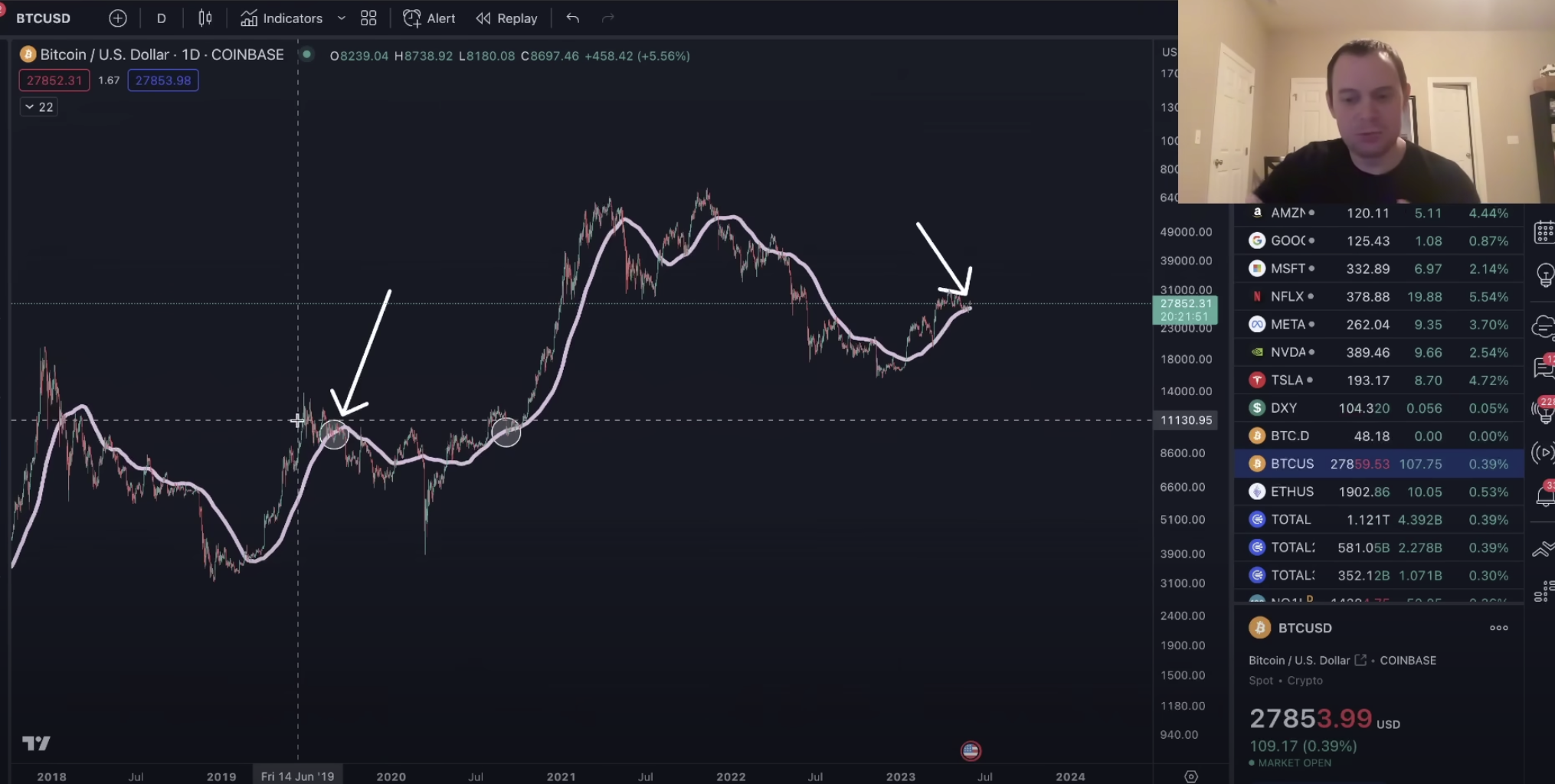Benjamin Cowen: Bitcoin Prices May Follow Nasdaq QQQ ETF!

Bitcoin Prices May Follow: In the ever-evolving world of cryptocurrency, few voices stand out as consistently insightful as Benjamin Cowen. A renowned figure in the crypto community, Cowen has built a reputation for his deep analysis of market trends, often focusing on the long-term price behavior of Bitcoin. Recently, Cowen has made an intriguing prediction: Bitcoin prices may follow the Nasdaq QQQ ETF. In this blog, we’ll explore what this means for Bitcoin’s future and how it could impact both Trump’s Bitcoin Reserve Plan and Shape the Markets. investors and the broader crypto market.
Understanding Benjamin Cowen’s View
Benjamin Cowen is known for his data-driven approach to cryptocurrency analysis. Rather than relying on hype or short-term fluctuations, Cowen focuses on the macro trends and long-term cycles that define the market. One of his key observations is that Bitcoin, despite being a decentralized asset, has shown correlations with traditional financial markets, especially the Nasdaq 100.
The Nasdaq QQQ ETF is a popular exchange-traded fund that tracks the performance of the Nasdaq 100 Index. This index includes some of the largest technology companies in the world, such as Apple, Microsoft, and Amazon. Cowen suggests that Bitcoin’s price movements may begin to mirror those of the Nasdaq QQQ ETF, primarily due to the growing institutional interest in both markets.
Why Could Bitcoin Follow the Nasdaq QQQ ETF?
- Increased Institutional Adoption: One of the main reasons Bitcoin could start to follow the Nasdaq QQQ ETF is the increasing involvement of institutional investors. As more large financial institutions add Bitcoin to their portfolios, the cryptocurrency may become more correlated with traditional assets like stocks. Institutions tend to follow the broader market trends, and if they view Bitcoin as a risk-on asset, it could behave similarly to tech stocks in the Nasdaq 100.
- Risk Appetite and Market Sentiment: The QQQ ETF is often seen as a barometer for risk appetite in the broader market. When investors are feeling optimistic, they tend to pile into tech stocks, pushing the Nasdaq 100 higher. Bitcoin, being a relatively volatile asset, could follow a similar pattern. In times of bullish market sentiment, Bitcoin may see higher demand, driving its price up in tandem with the Nasdaq.
- Macro-Economic Factors: Both Bitcoin and the Nasdaq 100 are influenced by macroeconomic factors such as interest rates, inflation, and global economic stability. If the Fed continues to implement policies that favor risk assets, both Bitcoin and tech stocks could see similar price movements. Cowen’s analysis suggests that Bitcoin’s price could be increasingly influenced by these broader economic trends, leading it to follow the same path as the Nasdaq QQQ ETF.
Historical Correlation Between Bitcoin and Nasdaq

While Bitcoin has often been seen as a non-correlated asset to traditional markets, there have been instances in the past where its price movements have mirrored those of the Nasdaq 100. For example, during periods of heightened risk appetite, both Bitcoin and tech stocks have surged in unison. Conversely, during market downturns, both have experienced sharp declines.
However, Cowen’s prediction suggests that this correlation could become more consistent over time. As Bitcoin continues to mature as an asset class and institutional adoption increases, the relationship between Bitcoin and the Nasdaq QQQ ETF could strengthen.
What Does This Mean for Bitcoin Investors?
If Cowen’s prediction proves accurate, Bitcoin investors may need to adjust their strategies to account for its increasing correlation with the Nasdaq QQQ ETF. Here are a few potential implications:
- Diversification: If Bitcoin begins to follow the Nasdaq QQQ ETF, it could become a more integral part of a diversified investment portfolio. Investors who are already exposed to the Nasdaq 100 through ETFs may find that adding Bitcoin to their holdings provides additional upside potential, particularly in risk-on market conditions.
- Market Timing: Understanding the correlation between Bitcoin and the Nasdaq could help investors better time their entries and exits. If Bitcoin begins to mirror the Nasdaq’s movements, investors may be able to anticipate price trends by monitoring the performance of the QQQ ETF.
- Volatility: While Bitcoin’s volatility is a well-known characteristic, its potential to follow the Nasdaq QQQ ETF could bring about periods of extreme price swings. Investors will need to be prepared for these fluctuations and ensure they have a strategy in place to manage risk.
Conclusion
Benjamin Cowen’s assertion that Bitcoin may begin to follow the Nasdaq QQQ ETF is an exciting prospect for both crypto and traditional market investors. With institutional adoption on the rise and macroeconomic factors influencing both markets, the correlation between Bitcoin and the Nasdaq could become a defining feature of the cryptocurrency market in the coming years. Whether or not Cowen’s prediction comes to fruition, one thing is clear: Bitcoin is Bitcoin Prices May Follow becoming increasingly intertwined with the broader financial landscape, and understanding its potential relationship with traditional assets like the Nasdaq will be crucial for investors moving forward.
[sp_easyaccordion id=”4167″]




